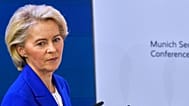The Duden dictionary has stated that the word could occasionally be perceived as discriminatory.
Germany's leading dictionary has changed its definition of the word "Jew" after a recent update sparked anger.
 ADVERTISEMENT
ADVERTISEMENT
 ADVERTISEMENT
ADVERTISEMENT
The country's Jewish community had reacted in anger after the Duden dictionary had added an explanation to its online edition of the term "jew" or "Jude" in German.
Duden had written that "occasionally, the term Jew is perceived as discriminatory because of the memory of the National Socialist use of language".
"In these cases, formulations such as Jewish people, Jewish fellow citizens or people of the Jewish faith are usually chosen," the dictionary added.
The reference led to an outcry from leading Jewish groups and individuals, who stressed that identifying themselves or being called Jews is not discriminatory.
The head of the Central Council of Jews in Germany, Joseph Schuster, said last week that for him the word “Jew” is neither a swear word nor discriminatory.
“Even if ‘Jew’ is used pejoratively in schoolyards or only hesitantly by some people, and the Duden editors are certainly well-meaning in pointing out this context, everything should be done to avoid solidifying the term as discriminatory,” Schuster said.
“Is it okay to say Jew? Yes," said Daniel Botmann, the executive director of the Central Council of Jews.
"Please don’t say ‘Jewish fellow citizens’ or ‘people of the Jewish faith’," he added on Twitter.
The publisher of Duden reacted to the criticism and updated its definition again Monday to reflect the Jewish community’s input.
“Because of their antisemitic use in history and in the present, especially during the Nazi era, the words Jew/Jewess have been debated ... for decades,” the dictionary’s website now reads.
“At the same time, the words are widely used as a matter of course and are not perceived as problematic. The Central Council of Jews in Germany, which has the term itself in its name, is in favour of its use.
The matter reflects ongoing sensitivities in Germany over anti-Semitism, more than 75 years after the Holocaust.
More than 6 million European Jews were murdered by Nazi Germany during the Third Reich.
The country's once-thriving Jewish community was reduced from around 600,000 to just 15,000 before around 200,000 Jews immigrated to Germany after the break up of the former Soviet Union.














